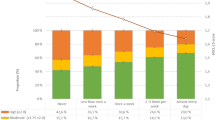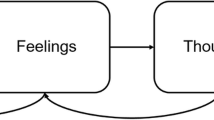Abstract
Training in mindfulness has been shown to improve a variety of psychological disorders as well as physical conditions. Additionally, mindfulness training has been shown to reduce risk-taking behaviors following several weeks of training. Reducing risk-taking behaviors is of particular importance in regard to specific mental health problems, such as substance use and eating disorders. Many studies that examine the effects of mindfulness utilize training programs that are several weeks in duration. However, some evidence indicates that brief, single-use mindfulness practices can have substantial effects on changing emotion and cognition in laboratory settings. The present study examined the immediate effects of a brief, single-use mindful body scan practice on risk-taking behavior in a laboratory setting. Participants included 153 undergraduate students at a major university in the southern USA. The experimental design was a randomized trial using an active control group, which engaged in a mind-wandering exercise. Results indicated that there was no significant interaction of condition by time on scores from the state mindfulness measure or the risk-taking task, yet main effects of time were observed for both variables. Findings suggest that the brief mindful body scan practice did not differentially effect mindfulness or risk-taking compared to the mind-wandering control exercise. However, there was a small, significant correlation observed between change in state mindfulness and change in risk taking for the full sample, suggesting a relationship between the variables of interest, albeit in the opposite direction as expected. Implications and limitations of the present study are discussed.

Similar content being viewed by others
References
American Psychiatric Association. (2013). Diagnostic and statistical manual of mental disorders (5th ed.). Washington, DC.
Aklin, W. M., Lejuez, C. W., Zvolensky, M. J., Kahler, C. W., & Gwadz, M. (2005). Evaluation of behavioral measure of risk taking propensity with inner city adolescents. Behaviour Research and Therapy, 43, 215–228. https://doi.org/10.1016/j.brat.2003.12.007.
Black, D. S., Sussman, S., Johnson, C. A., & Milam, J. (2012). Trait mindfulness helps shield decision-making from translating into health-risk behavior. Journal of Adolescent Health, 51, 588–592. https://doi.org/10.1016/j.jadohealth.2012.03.011.
Bögels, S., Hoogstad, B., van Dun, L., de Schutter, S., & Restifo, K. (2008). Mindfulness training for adolescents with externalizing disorders and their parents. Behavioural and Cognitive Psychotherapy, 36, 193–209. https://doi.org/10.1017/S1352465808004190.
Brown, K. W., & Ryan, R. M. (2003). The benefits of being present: mindfulness and its role in psychological well-being. Journal of Personality and Social Psychology, 84, 822–848. https://doi.org/10.1037/0022-3514.84.4.822.
Byrnes, J. P., Miller, D. C., & Schafer, W. D. (1999). Gender differences in risk-taking: a meta-analysis. Psychological Bulletin, 125, 367–383. https://doi.org/10.1037/0033-2909.125.3.367.
Cropley, M., Ussher, M., & Charitou, E. (2007). Acute effects of a guided relaxation routine (body scan) on tobacco withdrawal symptoms and cravings in abstinent smokers. Addiction, 102, 989–993. https://doi.org/10.1111/j.1360-0443.2007.01832.x.
Eberth, J., & Sedlmeier, P. (2012). The effects of mindfulness meditation: a meta-analysis. Mindfulness, 3, 174–189. https://doi.org/10.1007/s12671-012-0101-x.
Feldman, G., Greeson, J., & Senville, J. (2010). Differential effects of mindful breathing, progressive muscle relaxation, and loving-kindness meditation on decentering and negative reactions to repetitive thoughts. Behaviour Research and Therapy, 48(10), 1002-1011. https://doi.org/10.1016/j.brat.2010.06.006.
Fish, J., Brimson, J., & Lynch, S. (2016). Mindfulness interventions delivered by technology without facilitator involvement: what research exists and what are the clinical outcomes? Mindfulness, 7, 1011–1023. https://doi.org/10.1007/s12671-016-0548-2.
Flook, L., Smalley, S. L., Kitil, M., Galla, B. M., Kaiser-Greenland, S., Locke, J., et al. (2010). Effects of mindful awareness practices on executive functions in elementary school children. Journal of Applied School Psychology, 26, 70–95. https://doi.org/10.1080/15377900903379125.
Godfrey, K. M., Gallo, L. C., & Afari, N. (2015). Mindfulness-based interventions for binge eating: a systematic review and meta-analysis. Journal of Behavioral Medicine, 38, 348–362. https://doi.org/10.1007/s10865-014-9610-5.
Grow, J. C., Collins, S. E., Harrop, E. N., & Marlatt, G. A. (2015). Enactment of home practice following mindfulness-based relapse prevention and its association with substance-use outcomes. Addictive Behaviors, 40, 16–20. https://doi.org/10.1016/j.addbeh.2014.07.030.
Hadash, Y., Segev, N., Tanay, G., Goldstein, P., & Bernstein, A. (2016). The decoupling model of equanimity: theory, measurement, and test in a mindfulness intervention. Mindfulness, 7, 1214–1226. https://doi.org/10.1007/s12671-016-0564-2.
Hamilton, J., Fawson, S., May, J., Andrade, J., & Kavanagh, D. J. (2013). Brief guided imagery and body scanning interventions reduce food cravings. Appetite, 71, 158–162. https://doi.org/10.1016/j.appet.2013.08.005.
Hendrickson, K. L., & Rasmussen, E. B. (2013). Effects of mindful eating training on delay and probability discounting for food and money in obese and healthy-weight individuals. Behaviour Research and Therapy, 51, 399–409. https://doi.org/10.1016/j.brat.2013.04.002.
Kabat-Zinn, J. (1990). Full catastrophe living: using the wisdom of your body and mind to face stress, pain and illness. New York, NY: Delacorte.
Kabat-Zinn, J. (1994). Wherever you go, there you are: mindfulness meditation in everyday life. New York, NY: Hyperion.
Kallapiran, K., Koo, S., Kirubakaran, R., & Hancock, K. (2015). Review: Effectiveness of mindfulness in improving mental health symptoms of children and adolescents: a meta-analysis. Child and Adolescent Mental Health, 20, 182–194. https://doi.org/10.1111/camh.12113.
Khoury, B., Lecomte, T., Fortin, G., Masse, M., Therien, P., Bouchard, V., & … Hofmann, S. G. (2013a). Mindfulness-based therapy: a comprehensive meta-analysis. Clinical Psychology Review, 33, 763–771. doi:https://doi.org/10.1016/j.cpr.2013.05.005.
Khoury, B., Lecomte, T., Gaudiano, B. A., & Paquin, K. (2013b). Mindfulness interventions for psychosis: a meta-analysis. Schizophrenia Research, 150, 176–184. https://doi.org/10.1016/j.schres.2013.07.055.
Khoury, B., Sharma, M., Rush, S. E., & Fournier, C. (2015). Mindfulness-based stress reduction for healthy individuals: A meta-analysis. Journal of Psychosomatic Research, 78(6), 519-528. https://doi.org/10.1016/j.jpsychores.2015.03.009
Klingbeil, D. A., Fischer, A. J., Renshaw, T. L., Bloomfield, B. S., Polakoff, B., Willenbrink, J. B., Copek, R. A., & Chan, K. T. (2017a). Effects of mindfulness-based intervention on disruptive behavior: a meta-analysis of single-case research. Psychology in the Schools, 54, 70–87. https://doi.org/10.1002/pits.21982.
Klingbeil, D. A., Renshaw, T. L., Willenbrink, J. B., Copek, R. A., Chan, K. T., Haddock, A., Yassine, J., & Clifton, J. (2017b). Mindfulness-based interventions with youth: a comprehensive meta-analysis of group-design studies. Journal of School Psychology, 63, 77–103. https://doi.org/10.1016/j.jsp.2017.03.006.
Lakey, C. E., Campbell, W. K., Brown, K. W., & Goodie, A. S. (2007). Dispositional mindfulness as a predictor of the severity of gambling outcomes. Personality and Individual Differences, 43, 1698–1710. https://doi.org/10.1016/j.paid.2007.05.007.
Lejuez, C. W., Read, J. P., Kahler, C. W., Richards, J. B., Ramsey, S. E., Stuart, G. L., & … Brown, R. A. (2002). Evaluation of a behavioral measure of risk-taking: the Balloon Analogue Risk Task (BART). Journal of Experimental Psychology: Applied, 8, 75–84. doi:https://doi.org/10.1037/1076-898X.8.2.75.
Levin, M. E., Dalrymple, K., & Zimmerman, M. (2014). Which facets of mindfulness predict the presence of substance use disorders in an outpatient psychiatric sample? Psychology of Addictive Behaviors, 28, 498–506. https://doi.org/10.1037/a0034706.
Levin, M. E., Hildebrandt, M. J., Lillis, J., & Hayes, S. C. (2012). The impact of treatment components suggested by the psychological flexibility model: a meta-analysis of laboratory-based component studies. Behavior Therapy, 43, 741–756. https://doi.org/10.1016/j.beth.2012.05.003.
Linehan, M. M. (1993). Cognitive-behavioral treatment of borderline personality disorder. New York, NY: Guilford Press.
Nhat Hanh, T. (2006). Transformation and healing: sutra on the four establishments of mindfulness (2nd ed.). Berkeley, CA: Parallax Press.
Ostafin, B. D., & Kassman, K. T. (2012). Stepping out of history: mindfulness improves insight problem solving. Consciousness and Cognition: An International Journal, 21, 1031–1036. https://doi.org/10.1016/j.concog.2012.02.014.
Panos, P. T., Jackson, J. W., Hasan, O., & Panos, A. (2014). Meta-analysis and systematic review assessing the efficacy of dialectical behavior therapy (DBT). Research on Social Work Practice, 24, 213–223. https://doi.org/10.1177/1049731513503047.
Parker, A. E., Kupersmidt, J. B., Mathis, E. T., Scull, T. M., & Sims, C. (2014). The impact of mindfulness education on elementary school students: evaluation of the Master Mind program. Advances in School Mental Health Promotion, 7, 184–204. https://doi.org/10.1080/1754730X.2014.916497.
Renshaw, T. L., & Cook, C. R. (2017). Mindfulness in the schools—historical roots, current trends, and future directions. Psychology in the Schools, 54, 5–12. https://doi.org/10.1002/pits.21978.
Reynolds, A., Keough, M. T., & O’Connor, R. M. (2015). Is being mindful associated with reduced risk for internally-motivated drinking and alcohol use among undergraduates? Addictive Behaviors, 42, 222–226. https://doi.org/10.1016/j.addbeh.2014.11.027.
Roemer, L., & Orsillo, S. M. (2003). Mindfulness: a promising intervention strategy in need of further study. Clinical Psychology: Science and Practice, 10, 172–178. https://doi.org/10.1093/clipsy/bpg020.
Ruskin, D., Kohut, S. A., & Stinson, J. (2014). The development of a mindfulness-based stress reduction group for adolescents with chronic pain. Journal of Pain Management, 7, 301–312.
Samson, J. E., & Tanner-Smith, E. E. (2015). Single-session alcohol interventions for heavy drinking college students: a systematic review and meta-analysis. Journal of Studies on Alcohol and Drugs, 76, 530–543. https://doi.org/10.15288/jsad.2015.76.530.
Shoham, A., Goldstein, P., Oren, R., Spivak, D., & Bernstein, A. (2017). Decentering in the process of cultivating mindfulness: an experience-sampling study in time and context. Journal of Consulting and Clinical Psychology, 85, 123–134. https://doi.org/10.1037/ccp0000154.
Shonin, E., & Van Gordon, W. (2015). Practical recommendations for teaching mindfulness effectively. Mindfulness, 6, 952–955. https://doi.org/10.1007/s12671-014-0342-y.
Tanay, G., & Bernstein, A. (2013). State Mindfulness Scale (SMS): development and initial validation. Psychological Assessment, 25, 1286–1299. https://doi.org/10.1037/a0034044.
Turner, C., McClure, R., & Pirozzo, S. (2004). Injury and risk-taking behavior—a systematic review. Accident Analysis and Prevention, 36, 93–101. https://doi.org/10.1016/S0001-4575(02)00131-8.
Ussher, M., Spatz, A., Copland, C., Nicolaou, A., Cargill, A., Amini-Tabrizi, N., & McCracken, L. M. (2014). Immediate effects of a brief mindfulness-based body scan on patients with chronic pain. Journal of Behavioral Medicine, 37, 127–134. https://doi.org/10.1007/s10865-012-9466-5.
van der Vorst, H., Schuck, K., Engels, R. E., & Hermans, R. J. (2014). Children’s responses towards alcohol in virtual reality: associations between parental alcohol use, drinking selections and intentions to drink. Journal of Substance Use, 19, 429–435. https://doi.org/10.3109/14659891.2013.852257.
Viafora, D. P., Mathiesen, S. G., & Unsworth, S. J. (2015). Teaching mindfulness to middle school students and homeless youth in school classrooms. Journal of Child and Family Studies, 24, 1179–1191. https://doi.org/10.1007/s10826-014-9926-3.
Vidrine, J. I., Spears, C. A., Heppner, W. L., Reitzel, L. R., Marcus, M. T., Cinciripini, P. M., & … Wetter, D. W. (2016). Efficacy of mindfulness-based addiction treatment (MBAT) for smoking cessation and lapse recovery: a randomized clinical trial. Journal of Consulting and Clinical Psychology, 84, 824–838. doi:https://doi.org/10.1037/ccp0000117.
Wilson, B. M., Mickes, L., Stolarz-Fantino, S., Evrard, M., & Fantino, E. (2015). Increased false-memory susceptibility after mindfulness meditation. Psychological Science, 26, 1567–1573. https://doi.org/10.1177/0956797615593705.
Zenner, C., Herrnleben-Kurz, S., & Walach, H. (2014). Mindfulness-based interventions in schools—a systematic review and meta-analysis. Frontiers in Psychology, 5, 1–20. https://doi.org/10.3389/fpsyg.2014.00603.
Author information
Authors and Affiliations
Contributions
SU: designed and implemented the experiment, analyzed the data, as well as wrote up the majority of the manuscript. TR: aided in the design of the study, interpretation of the analyses, and made edits to the manuscript.
Corresponding author
Ethics declarations
Conflict of Interest
The authors declare that they have no conflict of interest.
Ethical Approval
All procedures involving human participants in this study were conducted in accordance with the ethical standards of the authors’ institutional research committee at Louisiana State University and with the 1964 Helsinki declaration and its later amendments or comparable ethical standards.
Informed Consent
Informed consent was obtained for all individual participants included in the study.
Rights and permissions
About this article
Cite this article
Upton, S.R., Renshaw, T.L. Immediate Effects of the Mindful Body Scan Practice on Risk-Taking Behavior. Mindfulness 10, 78–88 (2019). https://doi.org/10.1007/s12671-018-0948-6
Published:
Issue Date:
DOI: https://doi.org/10.1007/s12671-018-0948-6




